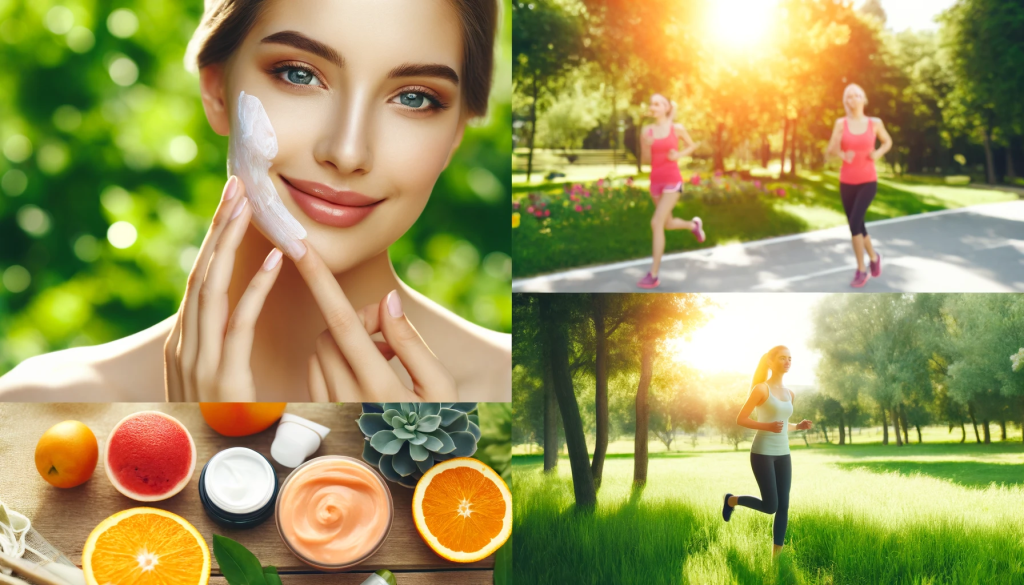Skin aging is an inevitable process that everyone undergoes, but its manifestations can be significantly slowed down with proper skincare, nutrition, and lifestyle. In this article, we will take a detailed look at a comprehensive approach to preserving skin youthfulness based on modern scientific data and principles of evidence-based medicine. By incorporating these recommendations into your routine, you can extend the healthy and fresh appearance of your skin.
Why Does Skin Age?
Skin aging results from the complex interaction of internal and external factors. Internal causes include genetics, hormonal changes, a decrease in collagen and elastin levels, slower cell renewal, and a reduction in hyaluronic acid in the skin. External factors such as ultraviolet (UV) radiation, environmental pollution, stress, poor nutrition, and harmful habits accelerate this process.
One of the main causes of external skin aging is the impact of free radicals. These unstable molecules damage cells and lead to oxidative stress, accelerating wrinkles, loss of elasticity, and other signs of aging.
How Does Skin Aging Manifest?
The primary signs of aging include:
- The appearance of wrinkles and folds.
- Loss of firmness and elasticity.
- Changes in skin texture, becoming drier and thinner.
- The development of pigmentation spots.
- Reduced ability of the skin to recover from damage.
These changes are associated with structural disruptions in the dermis, where collagen and elastin fibers are located.
Comprehensive Skin Care

Basic skincare involves several key steps:
- Cleansing
Regular cleansing removes dirt, sebum, and makeup residues. Choose products suitable for your skin type to avoid over-drying. Use gentle gels or foams in the morning and add a two-step cleansing process with hydrophilic oil in the evening. - Toning
After cleansing, the skin needs to restore its pH balance. Use toners with moisturizing ingredients such as hyaluronic acid to prepare the skin for serums and creams. - Moisturizing and Nourishing
A moisturizer should be the foundation of your skincare routine. Products with ceramides, squalane, and natural oils prevent moisture loss. For nighttime, opt for richer textures. - Sun Protection
Protection from UV radiation is a critical anti-aging measure. Use products with an SPF of at least 30 daily, even indoors. - Antioxidants
The use of serums with antioxidants, such as vitamin C, helps combat free radicals, improving skin texture and adding radiance. - Retinoids
Retinol and its derivatives stimulate collagen production, accelerate cell renewal, and reduce the visibility of fine wrinkles. Use them cautiously to avoid irritation. - Peels and Masks
Chemical peels with AHA and BHA acids help remove dead cells, improve skin texture, and stimulate renewal. Hydrating and nourishing masks help maintain balance.
Nutrition for Maintaining Skin Youth

Skin health is directly linked to what you eat. To preserve its firmness and health, include the following in your diet:
- Foods rich in antioxidants: berries, citrus fruits, green tea.
- Omega-3 fatty acids: salmon, mackerel, avocado. These strengthen the skin barrier and prevent inflammation.
- Foods high in vitamins A, C, and E: carrots, spinach, nuts.
- Zinc and selenium: almonds, sunflower seeds, Brazil nuts. These minerals support skin health and protect it from damage.
Avoid excessive sugar consumption, as it promotes glycation — a process that breaks down collagen fibers.
The Impact of Lifestyle on Skin
Your lifestyle plays a crucial role in maintaining youthful skin.
- Sleep
Cell regeneration occurs during sleep. Sleep deprivation slows these processes and worsens skin condition. Aim for at least 7–8 hours of sleep per night. - Physical Activity
Moderate physical activity improves blood circulation, delivering oxygen and nutrients to the skin. - Stress Management
Chronic stress increases cortisol levels, which negatively impacts skin health. Practices like yoga, meditation, and other relaxation techniques can help manage negative emotions. - Avoiding Harmful Habits
Smoking and alcohol have a destructive effect on the skin. Smoking reduces blood flow and contributes to collagen breakdown, while alcohol dehydrates the body.
Additional Methods to Combat Aging
Modern cosmetology offers a wide range of procedures to help prevent skin aging. These include:
- Hyaluronic acid injections for hydration and wrinkle filling.
- Botulinum therapy to relax facial muscles.
- Laser treatments to stimulate collagen production.
- Microneedling for skin renewal.
These methods provide noticeable effects but should be combined with regular home care.
How to Choose Anti-Aging Products

When selecting anti-aging cosmetics, pay attention to active ingredients:
- Retinoids for stimulating collagen production.
- Peptides for skin strengthening.
- Antioxidants, such as vitamins C and E, for protection against free radicals.
Avoid products with harsh components like alcohol or parabens.
Conclusion: A Comprehensive Approach to Skin Youthfulness
Maintaining youthful skin requires a comprehensive approach, including proper care, balanced nutrition, a healthy lifestyle, and the use of modern technologies. Regular use of antioxidants, moisturizers, and SPF protection, combined with avoiding harmful habits, will help preserve skin firmness, radiance, and health.

















Pingback: Causes of Acne: Key Factors Affecting Skin Condition - Medhouse.info
Pingback: Unlock Your Best Skin Ever: The Complete Skincare Playbook - Medhouse.info